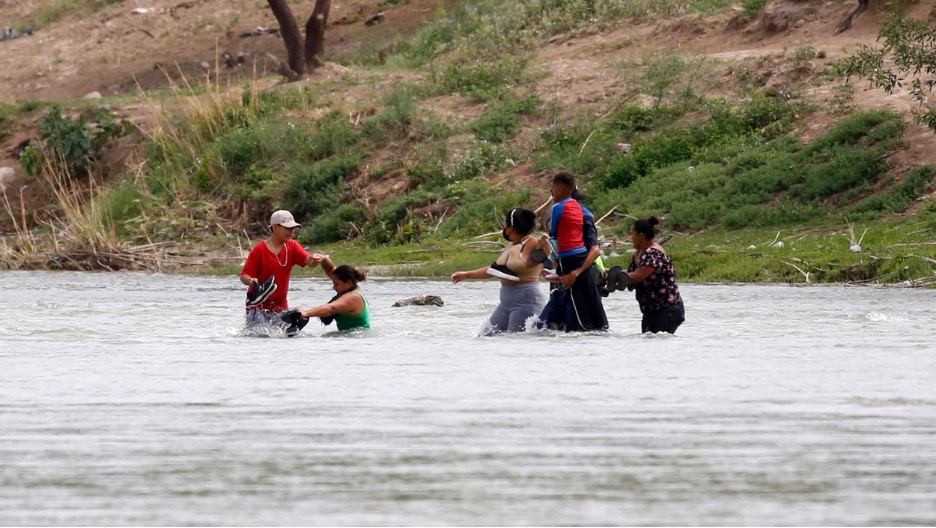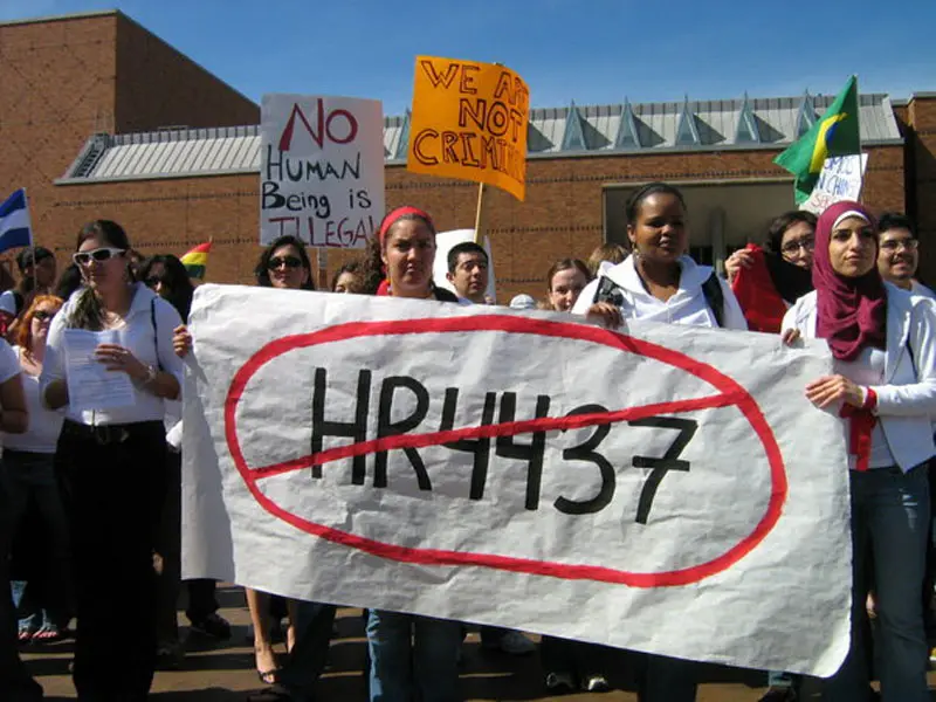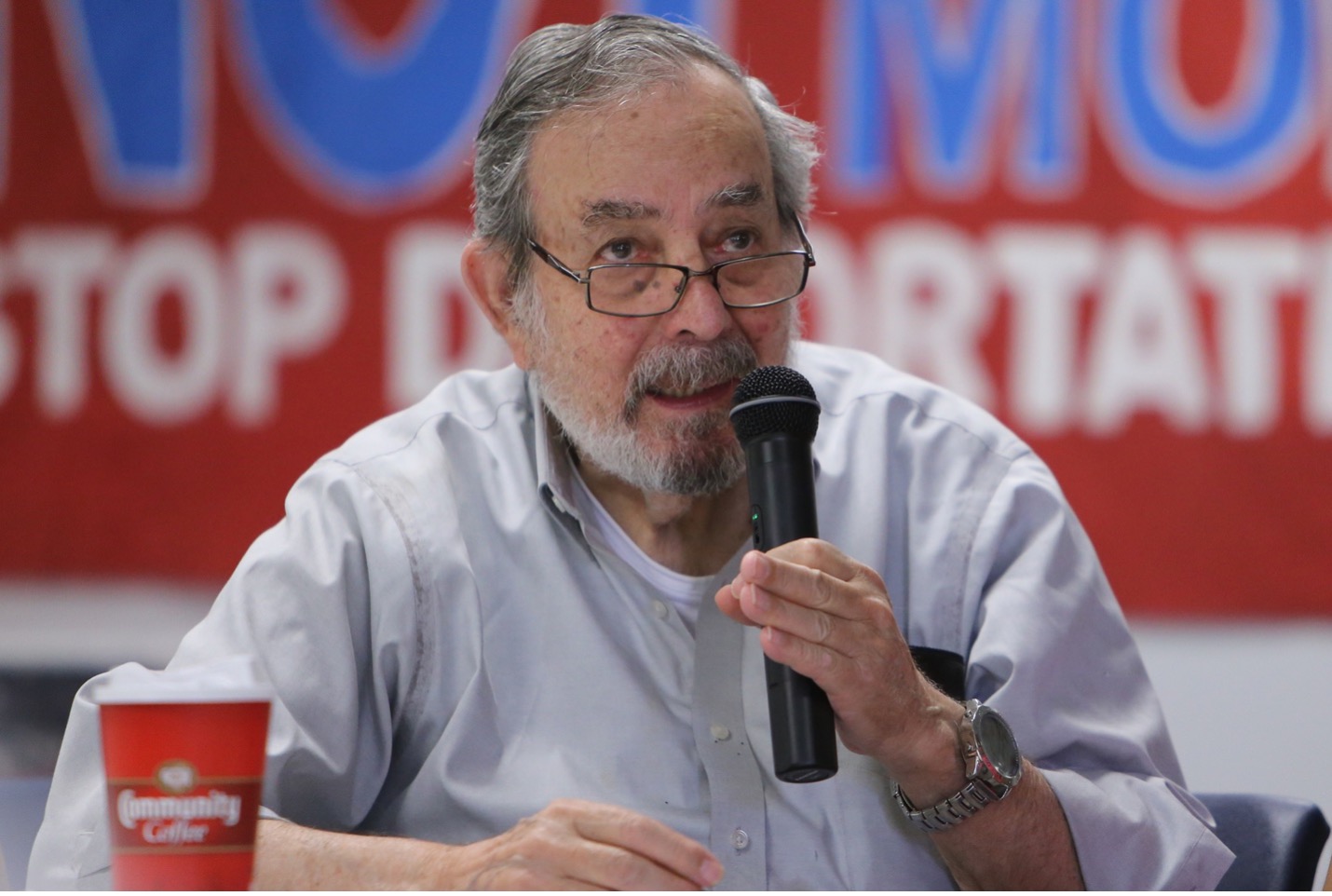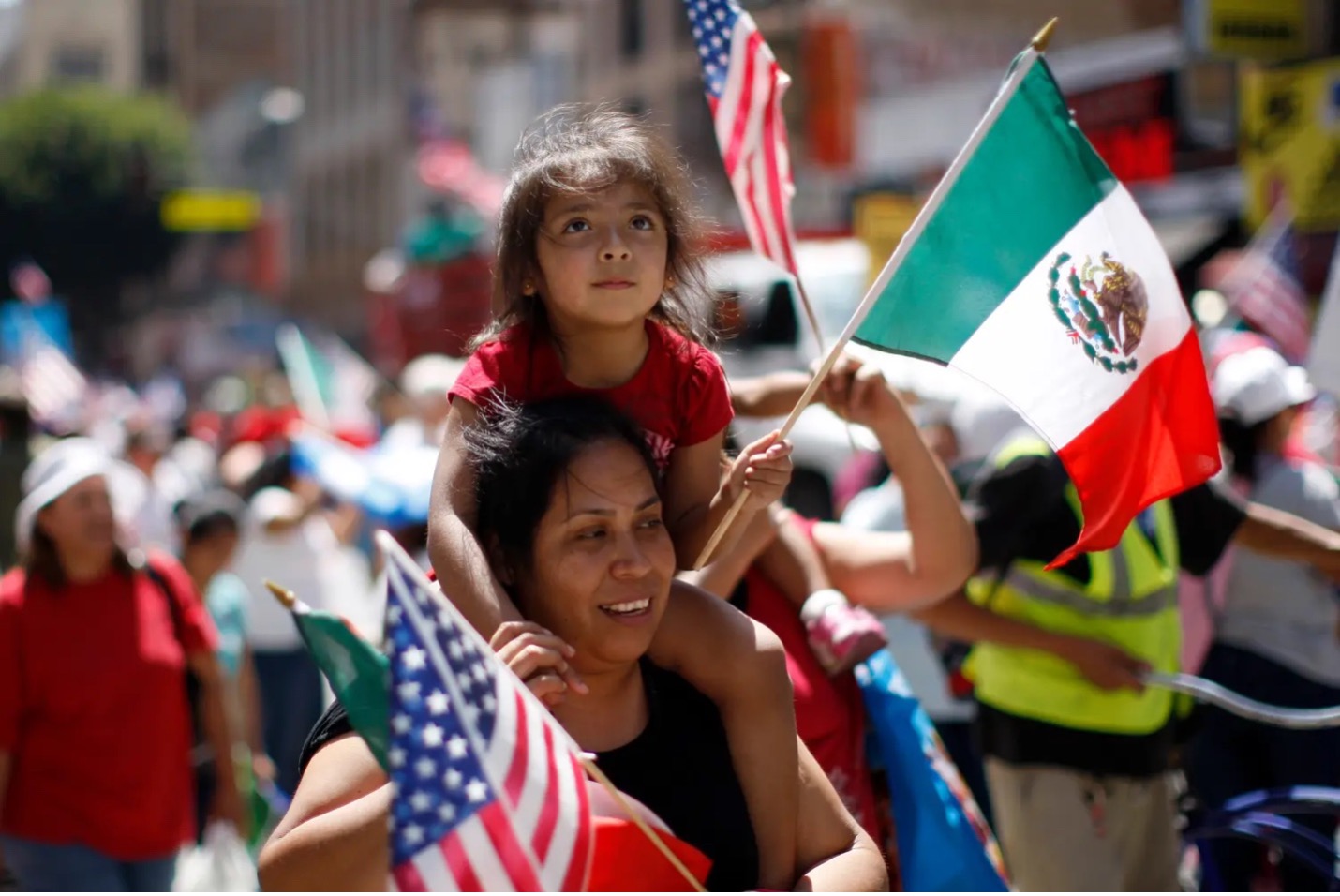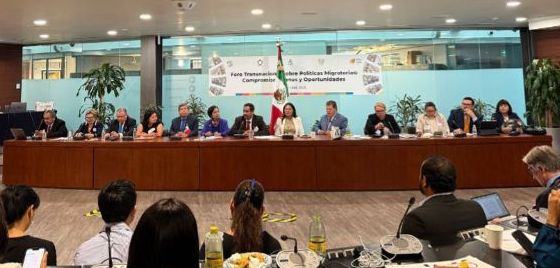|
|
The weekly newsletter of the Mexico Solidarity Project |
|
Every issue archived online at mexicosolidarityproject.org/archives/ |
|
November 19, 2025 |
|
|
|
Migrating: Many Rivers to Navigate |
|
Meizhu Lui, for the editorial team |
|
|
Migrants cross the Rio Grande river toward the US in Eagle Pass, Texas, May 22, 2022: Tibisay Zea for The World |
|
A Chinese foreign student meets his professor for the first time and compliments him, “You’re so fat!” Arriving in the US as a boy, a Cambodian had never lived in a house with a flush toilet, and it puzzled him. “Maybe it’s a washing machine?” A Somali family wonders why they’re asked for their birthdates, which are not important to them. All the family members write “January 1.”
I heard those stories when teaching immigrants how to navigate the convoluted US health care system. Figuring out how to live in a different culture is hard enough, not to mention how to get health care.
But that’s nothing compared to the complexities of US immigration laws. What if you need to drive in order to work, but it’s illegal to have a license? What if you’re a child born in the US returning to Mexico with your Mexican-born family and now need Mexican citizenship?
As their lawyer, Aaron Ortiz-Santos helped migrant families confront these perplexities, though they often couldn’t afford to pay him. We often commend altruists like him as do-gooders. But as he reminds us, helping others does as much good for the helper as the helped. It feeds our souls, whether we believe we have one or not!
Helping one person at a time, especially as the ropes of the immigration system tighten, is clearly not enough. It naturally leads to the path of advocacy and activism, to doing everything possible to change the rules. Ortiz-Santos took that path. He works to remove the frightening and complex obstacles that migrants face as they navigate the dangerous waters that just might lead to a new home.
Just knowing he’s on the right side of justice will be his reward. |
|
|
Becoming a Defender of Migrants |
|
Aarón Ortiz Santos, originally from Mexico City, has lived in Atlanta for over 20 years. An attorney and activist working with the Mexican migrant community, he serves as US Political Affairs Coordinator at the Council of Mexican Migrant Federations and Organizations (COLEFOM). He leads initiatives on migrant regularization and electoral reform to strengthen legalization and civic participation for Mexicans abroad. He promotes human rights, community empowerment and institutional collaboration between Mexico and the United States. |
|
|
Yours is not the usual migrant story!
As a Mexico-trained lawyer, I originally worked for a US-based insurance company as a compliance officer to prevent money laundering, and they transferred me from Mexico to the Atlanta office. My work had nothing to do with migration, and I wasn’t politically active. When eventually my job ended, I remained in Atlanta. |
|
After 9/11, this country’s attitudes toward the migrant community became much more negative. In 2006, a friend invited me to join him in organizing a march to protest the Border Protection, Anti-Terrorism and Illegal Immigration Control Act of 2005, or the Sensenbrenner Bill. Among other measures, it authorized building a double fence at the US-Mexico border and criminalized assisting an undocumented immigrant to remain in the US. |
|
|
Immigration Rights Protest at University of Washington, Seattle in the spring of 2006 to oppose Bill H.R. 4437 (or Sensenbresser Bill) |
|
|
Teodoro Maus, defender of immigrants, passed away in 2019 at the age of 84. |
|
In that campaign, I met Teodoro Maus, the first person appointed, in 1994, as the Mexican consul in Atlanta. A true community leader, he founded the Georgia Latino Alliance for Human Rights. He became my mentor, and for the first time I met many Mexican and Central American migrants. |
|
I realized their stories were not just about the “American dream,” but about the lack of human rights for both those with and without legal status, but especially for those without.
They opened my eyes and completely changed my life. From a corporate lawyer in a suit and tie, I became a defender of immigrants.
From corporate lawyer to immigration lawyer! What kinds of cases were there?
An immigration law office hired me because I was a native Spanish speaker, and a lot of the cases were with Mexicans. Most of the immigrants didn’t have money to pay us; some could make a small down payment with affordable monthly payments, but most cases were pro bono, made possible with grants from the American Civil Liberties Union and the Mexican American Legal Defense and Educational Fund.
Many cases involved driving without a license. Georgia is not New York or Chicago or Los Angeles, where you can manage without a car. Good public transportation doesn’t exist — and it’s illegal for an immigrant to get a license. I remember a woman student brought to the US as a child who was arrested and jailed. Luckily, Obama had just established the DACA program, and we got her legalized as a Dreamer. |
|
|
Celebrating DACA, 2015 |
|
If someone was arrested by ICE and put in jail, their family could post bond and have them released. I remember getting bond for one man. I often met with my client in the lobby of the office, and when I came to speak with him, his little son pointed to me and said, “Look, that’s the guy who brought you back!” I’m not religious, but when people say, “Bless you,” I do feel blessed! It was rewarding work.
But now, things have changed. Since migrants can’t get a driver’s license in Georgia, some people get one in another state. But Georgia no longer accepts those licenses, and driving without a Georgia license is considered a crime. Yes, a crime! And if you get arrested, you can no longer post immigration bond if you entered the US without papers. You must either “self-deport” or stay in jail while your immigration case is proceeding — and your chances of winning are not good. My clients aren’t criminals, and it breaks my heart that they sit in jail.
What is the Council of Mexican Migrant Federations and Organizations, or COLEFOM? What is its mission?
In Mexico there used to be a federal Institute of Mexicans Abroad to enhance the lives of people in the Mexican diaspora; it had an advisory board of Mexicans living in the US and Canada. I was appointed for a term before 2006, but then President Calderón dismantled the advisory board. |
|
|
Last April 24, in the Senate of the Republic, the Declaration of the Transnational Forum on Migration Policy was signed, as a result of a collective process between COLEFOM, UNAM and representatives of the legislature.
|
|
In 2020, Efrain Jimenez decided to form a similar network and founded COLEFOM, with over 100 Mexican organizations mostly in the US. It has no paid staff — I work as a volunteer to give back to my community. But we can still accomplish a lot because many of the organizations do have paid staff.
It’s a very democratic coalition. Organizations of all political stripes are welcome. We don’t have a hierarchical structure. Instead of debate, we have dialogue. Decisions are made in assemblies by simple majority votes. Meetings are called as issues arise.
We have several committees. One fundraises for small Mexican communities that identify improvements they need — like a basketball court or better access to water. Our health committee is training people to be mental health providers because depression is common among migrants — they are often alone and living in fear.
I’m the coordinator of political affairs. We work to improve laws and programs that help migrants. For example, when kids born in the US moved to Mexico, Mexican officials required a special US document that authenticated their US birth certificates. The certificate enabled them to become Mexican citizens, which allowed them to access social welfare benefits. It was a cumbersome process and COLEFOM got rid of it.
Now, we’re working on USMCA reform. As COLEFOM’s representative at the December open hearing called by the US Trade Representative, I’ll present our proposal that people be allowed to move freely between the US, Canada and Mexico, similar to the mobility enjoyed by people in the countries of the European Union. |
|
|
The setting sun illuminates a mountain that creates a gap in the border wall near Mexicali, Baja, CA: Photo courtesy Daniel Ochoa de Olza/Panos Pictures: The Guardian, 11/25 |
|
Of course, immigration reform is a big priority. Before, Republicans opposed reforms because the border wasn’t secure. Now it’s secure, so hopefully we can get a new immigration policy.
How do you propose to strengthen the voice and participation of migrants in both Mexico and the US?
Mexico will have electoral reform in 2026. We propose having ten congresspeople and five senators who live abroad. Now, the migrant community has five congresspeople and one senator — and we had to sue the electoral commission for affirmative action to get that! Because Mexicans living abroad can only vote for president, governors and senators, we propose that we vote for congresspeople as well. |
|
|
Jeff Greenberg: Getty Images: Patricia Guadalupe for This Day in HIstory, 2025 |
|
In the US, Cubans have a much smaller population than Mexicans, but they have many more elected officials and occupy high positions, like Marco Rubio, Secretary of Foreign Affairs. We need to run for office! |
|
Will our voters and candidates be progressive? That’s not clear; the Republican appeals to “family” and “religion” swayed many of our people.
We must figure out how to involve more young people in progressive politics in both Mexican and US elections, so we can pass the torch to the next generation. I’m grateful that I’ve been able to serve my people. And I’m not finished — we have a lot more work to do! |
|
|
|
|
A Mayor’s Murder, Sheinbaum’s Plan |
|
This article by chief staff writer Peter Davies in the November 10, 2025, issue of Mexico News Daily has been edited for length and clarity.
On November 10, the Mexican government announced the deployment of almost 2,000 additional troops to Michoacán, one of Mexico’s most violent states, as part of the new "Plan Michoacán for Peace and Justice." The $3.1 billion (57-billion-peso) initiative, presented by President Claudia Sheinbaum at the National Palace in Mexico City, was prompted by the murder of the mayor of Uruapan on Nov. 1. It presents a comprehensive strategy based on 12 central tenets and over 100 actions, funded by a mix of public and private investment.
The president said she will personally follow up on Plan Michoacán every 15 days and provide public updates monthly at her morning press conference, la mañanera.”
She stressed that her plan is not a militarized “war” against drug cartels and rejected comparisons to former President Felipe Calderón’s “war against drug cartels,” launched nearly 20 years ago. She said, "Peace is not imposed with force.” Her comprehensive strategy is designed to address the root causes of violence.
Michoacán was Mexico’s seventh most violent state in the first nine months of 2025, recording 1,024 murders. The assassination of Uruapan mayor and anti-crime crusader Carlos Manzo — who was shot by a 17-year-old meth addict at a public event — triggered protests and reignited the national conversation about insecurity in Mexico.
Besides targeted killings and armed clashes, Michoacán, the hub of Mexico’s lucrative avocado industry, suffers from widespread extortion targeting avocado, lime and other crop producers. The state is also home to criminal drug enterprises because precursor chemicals used to make synthetic drugs, including fentanyl, are illegally imported via the Lázaro Cárdenas port on the Pacific coast.
Interior Minister Rosa Icela Rodríguez emphasized that the Michoacán Plan was devised following consultation with residents of Michoacán and representatives of “all sectors of society” in the state. It is based on 12 core tenets:
|
|
|
|
Recent news reports and commentaries, from progressive and mainstream media, |
|
Alex Vasquez & Gonzalo Soto, Sheinbaum’s China Tariff Plan Delayed as Backlash Builds Bloomberg. Mexican manufacturers warn that the proposed tariffs would raise production costs, given their dependence on Chinese imports for machinery, components, and raw materials.
Obed Rosas, Esto comienza para Salinas Pliego. Necesita pagar YA 48 mil millones, y todavía debe Sin Embargo. Fue en el Gobierno de Andrés Manuel López Obrador cuando, a pregunta de SinEmbargo, se precisó en marzo de 2024 que Salinas Pliego debía 63 mil millones de pesos por 17 juicios, un monto que originalmente ascendía a 38 mil millones de pesos, pero que aumentó luego de actualizaciones y por créditos emitidos en la pasada administración.
Mateo Crossa, Unequal Value Transfer from Mexico to the United States Monthly Review. The growth of the export industry, far from making Mexico’s economy more dynamic, has bled it dry beyond belief. Pedro Salmerón Sanginés, 500 años del asesinato de Cuauhtémoc La Jornada. Encabezó una resistencia en la que México se fue quedando solo frente a una alianza contraria.
Jennifer Suan, Mexican American Artists Celebrate Day of the Dead Amid ICE Attacks The Progressive Magazine. Artists in New York City are using their art to strengthen the Mexican community in the face of federal immigration raids.
Hacienda bloqueó 13 casinos ligados a ‘lavado’ de dinero Revista Contralínea. Esta mañana en su conferencia matutina, la presidenta Claudia Sheinbaum Pardo aseguró que “se están revisando todos los casinos, desde la perspectiva de seguridad y también de cumplimiento de la norma.”
Andrés Rodríguez, ‘The visa remover’: Christopher Landau’s scrutiny of Mexican social media accounts El País. The Deputy Secretary of State is trawling through social media to revoke papers from people who criticize the US, fueling a debate about sovereignty and freedom of speech.
La 4T, los medios públicos y la actitud patrimonialista Intervención y Coyuntura. No cabe duda: los procesos de democratización social no son lineales. Avanzan y retroceden, se bifurcan, se interrumpen. Los gestos progresistas no garantizan transformaciones sostenidas, y a veces, incluso, desembocan en lo contrario de lo que prometían.
MarÍa Verza, Mexico arrests a new suspect in 1994 assassination of a presidential candidate Washington Post. Federal prosecutors in Mexico arrested another alleged accomplice in the 1994 assassination of presidential candidate Luis Donaldo Colosio, a crime that shocked the country and remains unsolved , even though the confessed killer has been imprisoned for more than 30 years.
María del Pilar Martínez, General Motors tendrá nuevo contrato colectivo en San Luis Potosí: Con alza salarial y blindaje vs IA El Economista. El Sindicato Nacional "Carlos Leone", titular de la Constancia de Representatividad en la planta de General Motors en San Luis Potosí, está a punto de firmar su primer Contrato Colectivo de Trabajo. |
|
|
|
|
The Mexico Solidarity Project brings together activists from various socialist and left organizations and individuals committed to worker and global justice. We see the 2018 election of Andrés Manuel López Obrador as president of Mexico as a watershed moment. AMLO and his progressive Morena party aim to end generations of corruption, impoverishment, and subservience to US interests. Our Project supports not just Morena, but all Mexicans struggling for basic rights, and opposes US efforts to undermine organizing and Mexico’s national sovereignty.
Editorial committee: Meizhu Lui, Bruce Hobson, Agatha Hinman, Victoria Hamlin, Courtney Childs, Pedro Gellert. To give feedback or get involved yourself, please email us! |
|
Subscribe! Get the Mexico Solidarity Bulletin in your email box every week. |
|
Web page and application support for the Mexico Solidarity Project from NOVA Web Development, a democratically run, worker-owned and operated cooperative focused on developing free software tools for progressive organizations. |

